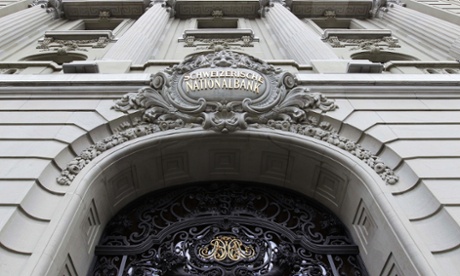
Leading shares are dropping sharply, losing all their early gains as the Swiss central bank abandoned its cap against the euro, despite an attempted recovery by copper after its recent plunge.
After a volatile few minutes trading the FTSE 100 is currently down 60.07 points lower at having earlier climbed as high as 6472, as the euro found its own level against the Swiss franc with a hefty slump. Investors were also trying to work out what this meant for the much anticipated quantitative easing plans expected to be unveiled by the European Central Bank next week.
The falls follow another overnight decline on Wall Street and despite rises in Asia, and wiped out all the early investor optimism.
On the positive side, the biggest riser so far is information services group Experian, up 34p at £10.99 after it reported flat organic revenues for the third quarter but said it was confident of returning to growth. Oriel Securities said:
We value the shares at around £12 using our discounted cashflow model. At the current price the stock is supported by a 6.3% free cashflow yield. We expect clearer articulation of strategy at the capital markets day on 28 January.
Liberum said:
We remain optimistic that organic growth should pick-up in the final quarter, not least aided by the annualisation of prior year acquisitions, the reducing size of consumer relative to the group as well as a continuation of improved trading conditions in credit services.
Our buy case remains predicated on the inherent strength of Experian’s positioning in credit, its opportunity to cross-sell new products, expand regionally as well as the cash generative strength of the business and its premium returns
Mining shares continue to be under pressure despite the rebound in copper as analysts at Barclays cut a number of target prices. Antofagasta is down 18p at 657p, and Anglo American has lost 2.5p to £10.40.
Imperial Tobacco has fallen 103p to £28.29 as its shares went ex-dividend.
Elsewhere Associated British Foods added 53p to £30.88 despite saying it expected a slight dip in full year earnings, as growth at Primark and its grocery business was offset by continuing weakness in its sugar business.
Whitbread is up 50p at £47.55 as Barclays raised its target price from £49 to £54. On the hotel sector Barclays said:
The outlook for the UK and US remains particularly strong, in our view, based on strong corporate capex projections. The outlook for Europe, however, remains more modest.
We expect 2015 to see further M&A though we expect this to be more about small to medium-sized deals then any mega-mergers. Nonetheless we believe this theme along with a buoyant property market will keep the sector multiples towards the upper end of their historical averages.
On Whitbread in particular it said:
Whitbread remains our preferred hotels pick. We believe the structural growth story is worth around 12-13% per annum and the cyclical recovery brings that to around 14-15% in our base case. Our upside case, which reflects a more pronounced recovery (more in line with 2014), would lead to a 18% earnings per share compound annual growth rate and would leave earnings per share 12% ahead of Bloomberg consensus in 2 years. With revenue per available room still 24% behind peak in the UK regions, we see our upside case as very plausible. Even just assuming our base case, given the high earnings per share compound annual growth rate, the PE/growth ratio stands at just 1.4 times.
But Home Retail Group, the owner of Argos and Homebase, has dropped 15.4p to 196.6p after weak Christmas sales.
As Brent crude continues to slide, down more than 3% at $47 a barrel, Tullow Oil has lost 6.8p to 351.1p after it wrote off $2.3bn relating to exploration work and its assets. Analyst Tony Shepard at Charles Stanley said:
Tullow is changing its strategy. The slump in the oil price is forcing the group to re-allocate its capital to producing and developing assets and to reduce its net exploration and appraisal expenditure. The group’s capital expenditure for 2015 is expected to be $1.9bn which includes a lower exploration spend of $0.2bn. The group finished 2014 with net debt of $3.1bn and debt levels are expected to continue to rise and gearing to remain elevated until oil from the $4.9bn TEN project comes on stream in the second half of 2016.
Tullow has hedged some of its 2015 output at higher oil prices but the risk is that if oil prices stay low for longer, rising debt could lead to a breach of its covenants. Although the share price has fallen sharply, Tullow Oil remains a high risk share and the decline in market value leaves it vulnerable to relegation from the FTSE 100 Index. Our recommendation is reduce (last recommendation was hold at 358p on 16 December 2014).
Meanwhile BP, up 0.4p at 382.55p, is also expected to announce cost cuts includine North Sea oil job losses.







